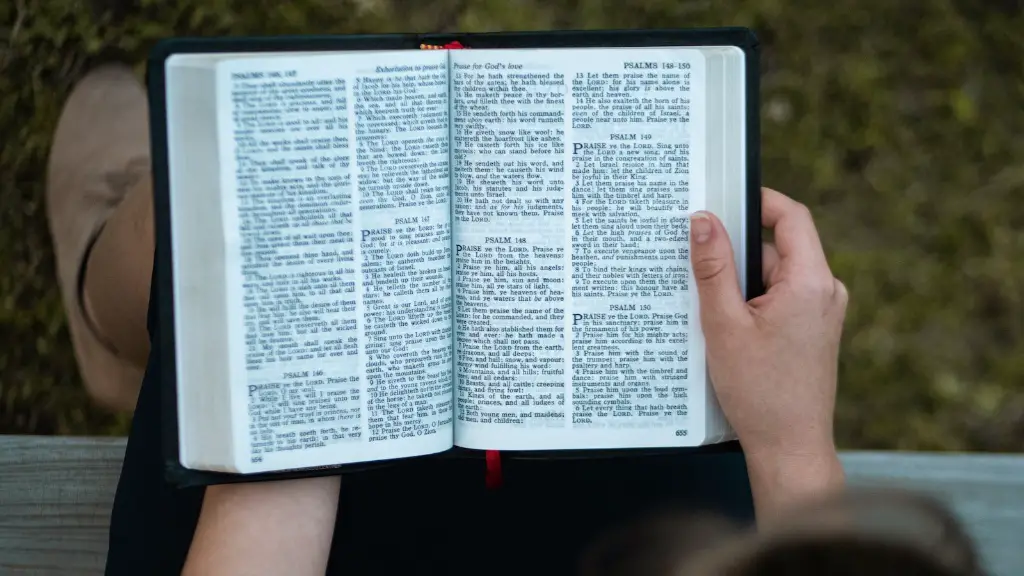Overview of Bible Translations
The Bible is a collection of ancient texts, compiled over centuries and held sacred by adherents of three primary religious traditions—Judaism, Christianity, and Islam. As such, it has been translated into many different languages over its long history. According to The Bible Society, the Bible is now available in 1,351 languages, with 2,542 versions of portions of the Bible, such as psalms, or gospels, or the full Bible. The dominant language of Bible translations is English (546 translations).
The Bible’s Long History of Translations
The Bible has been translated into many languages since its composition. The earliest known translation of the Bible was done in the second century C.E., from its original Hebrew, Aramaic, and Greek. During the Middle Ages, the Latin language was the dominant language used for translating the Bible. The first English translation of the Bible was done in the 14th century by John Wycliffe, followed by the King James Version in 1611.
Modern Bible Translation Efforts
In the modern era, Bible translation efforts have grown substantially, with a sharp upswing in the 20th century. This growth is due in part to technological advancements and globalization that have made translation easier and more accessible. The United Bible Society, founded in 1933, has been at the forefront of Bible translation work, and is the largest Bible translation organization in the world. In 2020, the United Bible Society reported that of the 7,200 languages spoken around the world, 2,072 of them still need a complete Bible translation. In order to meet the challenge of translating the Bible into new languages, the United Bible Society and other organizations use a combination of digital and mobile technologies, and apply linguistics research to bridge cultural and language gaps.
The Bible’s Significance to Different Communities
Regardless of the language, the Bible remains a sacred text to many different communities worldwide. In many cultures, the Bible is the cornerstone of religious and spiritual belief systems, providing guidance and moral teachings. For some communities, being able to read the Bible in a language they understand is a necessity for spiritual growth and connection. Having access to Christian religious texts in many languages has enabled minorities to understand, discuss, and practice their religious beliefs in a more meaningful way.
Challenges in Making Bible Translations
Bible translations, however, have not been free from controversy. Translating the Bible, which is considered a divine and perfect book, is a complex and difficult task. The language and idioms used in the source texts are difficult to capture, and the moral and ethical controversies embedded in the original scriptures can be difficult to translate accurately across cultures. Further, translating the Bible into languages spoken by indigenous communities posed an additional challenge in the form of creating alphabets and scripts that fit their language.
Statistical Information on Bible Translations
According to The Bible Society, the Bible has been translated into 1,351 languages, with 2,542 versions of portions of the Bible, such as psalms, gospels, or the full Bible. Of the many translations, 90% of the world’s population has access to a Bible in a language they can understand. Additionally, the Bible Society estimates that there are more than 833 million Bibles available in print across the world. This includes more than 196 million copies of the Bible in print in China alone, which constitute more than one-third of all Bibles in the world.
The Benefits of Bible Translations
The rise in the number of Bible translations has led to an increase in access to religious texts around the world. Bible translations free people to participate in the study of sacred doctrine and scriptural interpretation, thus creating stronger communities centered on the Bible and its teachings. Bible translations also facilitate collaboration between scholars of different languages, cultures, and generations. When the Bible is available in a myriad of languages, it creates more opportunities for Bible scholarship and understanding.
Preservation of Bible Translations
Over the years, Bible translations have also been preserved through various digital platforms. Organizations such as The Bible Society have digitized ancient Bible translations and made them available to the public, thus ensuring that these translations remain accessible and legible for future generations. Digital preservation of Bible translations ensures that these texts can be accessed with ease, allowing people to continue to study and learn from the Bible.
Advancement of Bible Translation Technology
With the advance of technology, Bible translation efforts have become even more efficient. Many of today’s Bible translations are computer-assisted, meaning that portions of the translation process are automated. Bible translation technology uses complex algorithms and databases to reduce the amount of time it takes to translate the Bible into different languages. Additionally, it has made it easier for scholars to translate the Bible accurately and interpret texts correctly across many different cultures.
Education and Awareness of Bible Translations
In order to ensure that people understand the importance and impact of Bible translations, there is a need for increased education and awareness about the process of Bible translation. Organizations such as The Bible Society are committed to providing programs and resources to increase public understanding of Bible translations. Further, many religious institutions now offer coursework and seminars focused on Bible translation, allowing individuals to become more informed about the process and the impact it can have on various cultural, religious, and linguistic communities.


